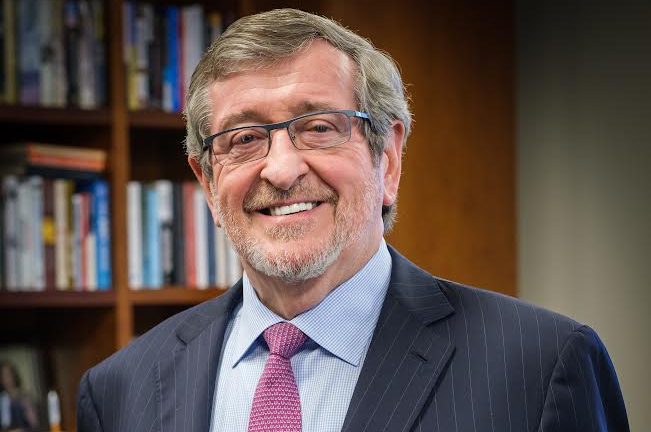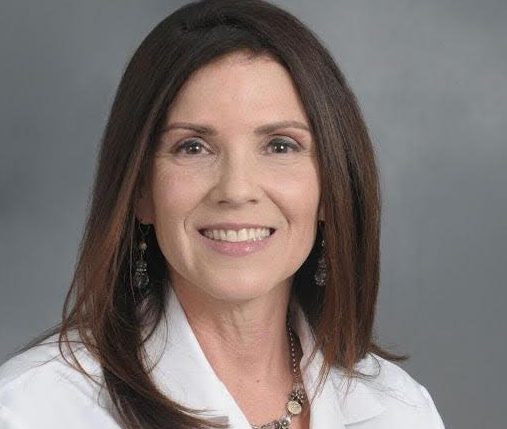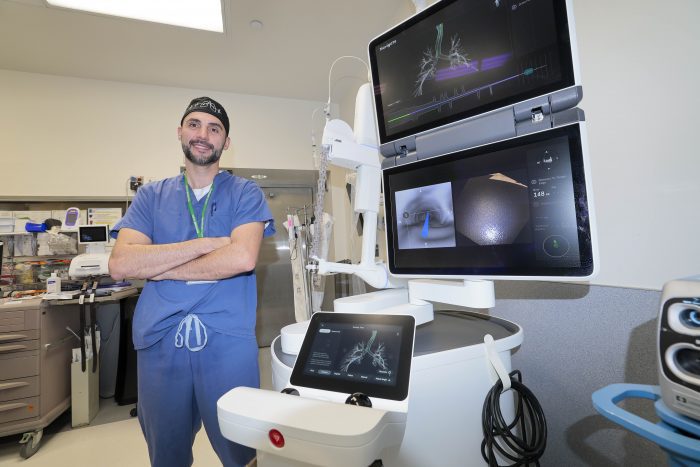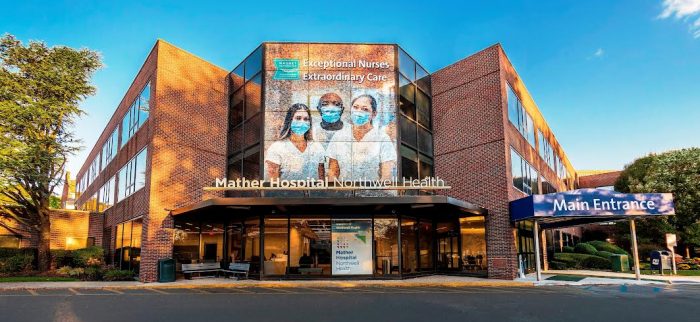Learn to be…tobacco-free. St. Charles Hospital’s Wisdom Conference Center, 200 Belle Terre Road, Port Jefferson will host a free 7-class tobacco cessation program on Jan. 9, 16, 23, 30, Feb. 6, Feb. 13 and Feb. 27 from 6 p.m. to 7:30 p.m. Make your New Year’s resolution now! For more information or to register, please call 631-853-2928 or 631-853-3162.
Northwell Health’s Michael Dowling recognized as one of Modern Healthcare’s 100 Most Influential People
For the 18th year, the president and CEO of New York’s largest health system has been named to the prestigious list – this year ranking number 35.
Northwell Health has announced that Michael Dowling, president and CEO, was recognized by Modern Healthcare as one of the 100 Most Influential People in Healthcare of 2024, coming in at number 35. The complete ranking can be found in the December issue of Modern Healthcare magazine.
This prestigious recognition program acknowledges and honors individuals who are deemed by their peers and the senior editors of Modern Healthcare to be the most influential figures in the industry in terms of leadership and impact. Michael has consistently ranked among the top leaders in health care on the annual list and was named the most influential in 2022.
“It is an incredible honor to be recognized by Modern Healthcare among such distinguished leaders. This recognition reflects the dedication of the entire Northwell Health team to not only providing exceptional care today, but also building the future of healthcare,” said Mr. Dowling. “At Northwell, we are committed to addressing critical issues like health equity, healthy aging, and gun violence prevention, ensuring that everyone can live a healthier life. Together, we can truly improve the health of everyone in our communities.”
As president and CEO of Northwell Health, he leads a clinical, academic and research enterprise with a workforce of more than 87,000. Northwell is the largest healthcare provider and private employer in New York State, caring for more than two million people annually through a vast network of more than 900 outpatient facilities and 21 hospitals. Under his leadership, Northwell’s annual operating budget has increased to more than $18 billion.
Mr. Dowling is focused on creating the health system of the future. This includes addressing today’s public health infrastructure and the inequities, like addressing Black maternal health disparities, that exist in access to care, especially in underserved communities and communities of color.
He has championed diversity, equity, and inclusion initiatives, resulting in a 90 percent employee satisfaction rate among diverse populations, significantly above the national average. Furthermore, Mr. Dowling has demonstrated a commitment to workforce development through the establishment of the Northwell School of Health Sciencesand a partnership with New York City public schools to create a dedicated health sciences high school.
Since 2019, he has remained a staunch advocate on national issues, including gun violence prevention. Under his leadership, he created the Center for Gun Violence Prevention, has hosted multiple Gun Violence Prevention Forums and has started a wide-reaching public campaign to raise awareness of gun violence. Through the Northwell-initiated National Health Care CEO Council on Gun Violence Prevention & Safety, 54 leading health care CEOs have pledged to leverage their collective influence and resources to curb the historic spike in gun-related deaths and injuries – including a commitment to help fund a $40 million national Ad Council PSA campaign.
Recognizing the inadequacy of most healthcare systems to address the growing needs of an aging population, Mr. Dowling continues to advocate for embracing innovation, technology, and new care models to ensure seniors age with dignity and access the support they need to thrive and to develop solutions to create more age-friendly health systems and improve overall care for our aging population. Just this year, Mr. Dowling coauthored the book, The Aging Revolution: The History of Geriatric Health Care and What Really Matters to Older Adults.
Stony Brook University’s ERM Holiday Toy Drive brings joy to Children’s Hospital patients
The season of giving is in full swing at Stony Brook! Pediatric patients at Stony Brook Children’s Hospital got a special visit from not only Santa Claus himself but everyones favorite Snowman Olaf and Stony Brook’s own mascot Wolfie on December 12th, as they stopped by to deliver some holiday cheer.
A caravan of 30 first responder vehicles traveled from the Wang Center to the Children’s Hospital to drop off dozens of presents collected during their annual Holiday Toy Drive.
Since 2019, Stony Brook University’s Division of Enterprise Risk Management has teamed up with campus Fire, Police, EMS & Emergency Management staff to collect new and unwrapped gifts for patients spending the holidays in a patient room instead of home with family and friends.
Selden native delivers a holiday surprise to patients at Stony Brook Children’s Hospital

By Toni-Elena Gallo
Selden resident Landan Hoenig has always been an altruistic young man.
When asked why Hoenig was interested in starting his two-year-old initiative Teddies for Happiness, his grandmother Christina Rundberg replied, “he has always been this way.”
“Landan is always getting involved with different things — very involved with our church when he was young. He’s just an all around good kid,” Rundberg continued.

This charity operation came to fruition in 2023, when Hoenig, a student at St. Joseph’s University who works as a traffic control officer for the Southampton Town Police Department, had interned with the Town Police in Spring of 2023 through the Suffolk County Community College Criminal Justice Program internship class, and was energized by his experience.
“Doing the internship with them and then getting a job as a traffic control officer with them, actually helped inspire me to create this event,” Hoenig said.
He originally planned to donate only teddy bears to Stony Brook Children’s Hospital but decided to expand the drive to include all types of toys when finalizing his idea. “I had only two months of prep time to put it all together. It was a very small turnout because, with two months, I really wasn’t sure what I was doing, but it was still very successful,” Hoenig explained.
Hoenig credits having a nine-month prepping period this time, helping make this year’s drive on a bigger scale.
“I knew what I was doing this time.”
In a similar format to 2023’s drive, Hoenig gathered the donated toys at a car show, this year held at the Levitt Ballfield Park in Centereach. Eighteen law enforcement agencies were involved in attracting attendees, including U.S. Customs and Border Protection, National Park Service Law Enforcement Rangers, New York State Police and Stony Brook University Police Department, as opposed to last year’s two, New York State Department of Environmental Conservation Police and Centereach Fire Department. There with their service vehicles, they invited visitors to engage with them as well as listen to music with radio stations 106.1 WBLI and 102.3 WBAB, eat Chick-Fil-A chicken sandwiches and cookies, provided by the restaurant chain and, most importantly, donate toys.
“About 150 to 200 people came, and I have eighteen boxes of toys. Half of them I put here at the hospital, and the other half I’m bringing to St. Cuthbert’s Episcopal Church in Selden, where they will be split up between the Saint Cuthbert’s Food Pantry and a local women’s shelter,” Hoenig said. The name of the shelter was not disclosed.
According to Councilmember Jonathan Kornreich (D, Stony Brook), while the Town of Brookhaven did co-sponsor the event and provided the car show’s venue, “all the credit for the hard work goes to Landan for his enormous time commitment in following up with all of these agencies.”
After numerous law enforcement agencies pulled up to Stony Brook Children’s Hospital on Friday, Dec. 6, including the Suffolk County Police Department and a van from the Suffolk County Sheriff’s office, numerous law enforcement agents unloaded their vehicles with the assistance of hospital volunteers.
Addressing the small crowd which gathered to assist and watch Hoenig carry out his mission to “provide joy to people no matter what type of situation they are in, even if it’s just a little bit of joy.” Hoenig thanked “not only the Stony Brook Children’s Hospital, but the great, amazing officers who want to help people. I cannot be more thankful, so thank you for being able to help me.’
“It was so fun organizing all of the boxes for two hours last night, because I am a last minute person,” he laughed.
Joan Alpers, director of Child Life Services at Stony Brook Medicine, was extremely grateful for Hoenig’s charitable spirit. “We are grateful for all of our main donors at this time of year, and he is one of our significant donors, and we’re happy to have him come back.”
“Thank you, I can’t wait to come back next year,” Hoenig smiled.
Mather Hospital dedicates new Outpatient Behavioral Health building

Northwell’s Mather Hospital in Port Jefferson formally dedicated its recently acquired Outpatient Behavioral Health Services building that allows the hospital to transform how it provides mental health services at a ribbon cutting ceremony on Nov. 25.
The building, located across the street from the hospital at 100 Highlands Blvd., was purchased with public and private funding totaling $9.2 million including a grant from the NYS Department of Health.
“Tonight, we choose hope. Tonight, we celebrate a victory,” Erin Dainer, MD, Chair of the Department of Psychiatry for Mather Hospital, said at the ribbon-cutting ceremony. “This facility, born from the collective will of government, healthcare providers, and generous philanthropists, stands as proof that together, we can make a difference. Within these walls, lives will be transformed.”
The building houses Mather’s Adult and Adolescent Partial Hospitalization Programs, Chemical Dependency Program, Eating Disorders and Gambling Addiction programs, and a new Rapid Access Center allowing patients immediate access to assessments and referrals for behavorial health care. The Center is expected to be opened by the end of the year.
As part of the acquisition, Mather also expanded its Adolescent Partial Hospitalization program by 10 slots and added a co-occurring disorders track. The hospital also added capacity for its outpatient Medication Assisted Treatment program.
A recent series of community leader forums conducted by the hospital revealed a severe shortage of behavioral health services for both adolescents and adults was a top concern.
“The statistics are stark, but they are not just numbers. They represent real people, our friends, family, and neighbors. Every year, more than one in five New Yorkers battle the invisible wounds of mental health disorders, and in any year one in ten face challenges so profound they impact their ability to work, to love, to simply live,” said Dr. Dainer. “The need is monumental and has only been made worse by the opioid epidemic and recent pandemic.”
“There is no doubt we have a mental health and substance abuse crisis in this country,” said Denise Driscoll, NP, Assistant Vice President for Behavioral Health at Mather Hospital, noting that 53 million Americans are living with mental illness. “Suicide is the 2nd leading cause of death among people aged 10-14 and the 12th leading cause of death overall in the U.S, and 2.5 million Americans are diagnosed with an opioid use disorder. According to the CDC, annual drug overdose deaths have eclipsed the peak of yearly deaths from car crashes, gun violence or any one year of the AIDS epidemic.”
Driscoll said that there is only one provider available for every 350 individuals looking for services, and 28% of adults experiencing mental health symptoms reported they were not able to access or navigate their way to the treatment they so desperately needed.
“Let 100 Highlands be a permanent symbol to our community that no one gets left behind and a beacon of hope to those living with mental illness and substance abuse that recovery and a life well lived is possible,” she said.
SBU News: Nurse clinician and educator named to new SUNY Nursing Simulation Fellowship
Debra Giugliano, RN, PhD, a Clinical Assistant Professor in the Stony Brook University School of Nursing, was recently selected by the State University of New York (SUNY) to be a member of the inaugural class of the SUNY Nursing Simulation Fellowship, an initiative for the 2024-25 academic year that will further advance all SUNY nursing programs to adopt simulation-based education for students.
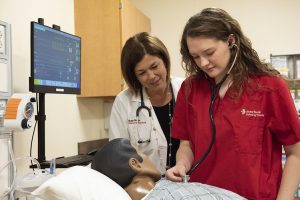
Announced by the SUNY Chancellor John B. King Jr., the Fellowship is also part of a larger effort to prepare more nurses for New York State’s health care workforce – a major objective of Governor Kathy Hochul and SUNY. It was developed based on recommendations from the SUNY Future of Health Care Workforce Task Force, a group organized to guide SUNY in addressing the critical health care workforce shortage and Governor’s goal of increasing this workforce in NYS by 20 percent. Nursing simulation is one of four priority areas identified by the Task Force.
The 11 Fellows of the inaugural class will advance their knowledge and skills in simulation training by completing a six-month continuing education and simulation training program, attending monthly virtual meetings and in-person retreats on the topic led by SUNY, and attend the International Meeting on Simulation Healthcare from January 10-14 in Orlando, Fla.
As of May 2023, SUNY nursing students can complete as much as one-third of their clinical training through simulation education.
“We are excited for the School of Nursing and for Dr. Giugliano with her selection for this inaugural Nursing Simulation Fellowship,” said Pat Bruckenthal, RN, PhD, Dean of the Stony Brook University School of Nursing. “This opportunity will enable Dr. Giugliano to bring our student learning experiences to the forefront of innovation and impact the preparation of our next generation of nurse leaders.”
A long-time clinician and educator in the School of Nursing and a resident of St. James, Giugliano is a certified pediatric nurse practitioner and pediatric oncology nurse. Her clinical specialties include caring for children with cancer and blood disorders in both inpatient and outpatient settings. The recipient of numerous awards in nursing clinical care and training, Giugliano is also the Founder and Director of the internationally recognized School Intervention and Reentry Program at Stony Brook Children’s Hospital.
“I am honored to have been chosen for this Fellowship and look forward to gaining the necessary expertise to elevate nursing simulation and create a nursing simulation network within SUNY,” said Giugliano.
She and other fellows will have the unique opportunity to shape the future of simulation-based learning across the SUNY system. Through their expertise, they will contribute to the development of the SUNY Simulation Shared Resource Library, a central repository of nursing simulation resources that will benefit nursing education programs system-wide.
Captions:
Simulation training in Stony Brook’s School of Nursing is an integral aspect of clinical education in the future workforce.
Credit: Jeanne Neville, Stony Brook Medicine
Debra Giugliano, RN, PhD
Credit: Jeanne Neville, Stony Brook Medicine
NYBC honors pediatric cancer patient at event for platelet donors on Long Island
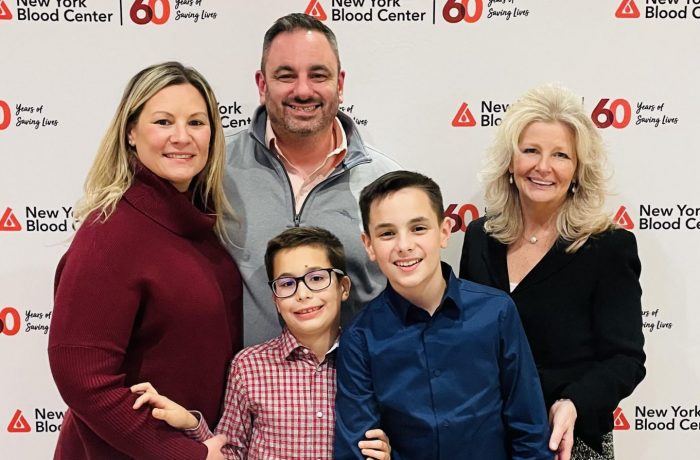
Vinny Cusumano, a young advocate for blood donations, received over 30 blood and platelet donations through transfusions during his treatment for kidney cancer.
New York Blood Center (NYBC) honored 12-year-old pediatric cancer survivor Vinny Cusumano at their recognition event for top platelet donors at Watermill Caterers in Smithtown. Vinny spoke to platelet donors at the event and thanked them for their life-saving contributions to the blood supply. Vinny’s family has been a fierce advocate for blood and platelet donations, partnering with NYBC on blood drives and other awareness campaigns through their nonprofit organization, Vinny’s Army, which is dedicated to supporting children diagnosed with cancer and their families.
In his remarks at the event, Vinny expressed heartfelt gratitude to the platelet donors in attendance. “There was never a question when my doctor told me that I needed a transfusion if one was available,” said Vinny Cusumano. “I know my parents tell me that New York Blood Center always needs donations and this is the reason why. I am the reason why. And I’m standing here today talking to all of you about my story because all of you have helped get me here.”
Vinny Cusumano was diagnosed with a rare and aggressive form of kidney cancer in October of 2022. He received over 30 donations of blood and platelets through transfusions during the intense chemotherapy and radiation treatments that were needed to save his life.
Vinny’s Army works to support children diagnosed with cancer and their families by providing unconditional love and support to ensure no family faces this battle alone. According to NYBC, 25 percent of the blood supply is used by patients battling cancer. Vinny’s Army has advocated for blood donations to support pediatric cancer patients who may require transfusions for their treatment.
“We are grateful to Vinny Cusumano and his incredible family for their advocacy efforts to ensure that the region has a robust blood supply to serve cancer patients who rely on blood donations for vital treatment,” said Andrea Cefarelli, Senior Vice President at New York Blood Center Enterprises. “From hosting blood drives, to participating in speaking engagements and spreading awareness, Vinny’s Army has been a great partner and we can’t think of a better organization to honor at our platelet donor event.”
Blood donors can give every 56 days, and platelet donors can give twice per month. The Food and Drug Administration (FDA) recently lifted several blood donor eligibility restrictions. To view current eligibility guidelines, visit nybc.org or call 800.688.0900.
To make an appointment at a donor center near you, donors can call 1-800-933-2566 or visit nybc.org. Can’t donate blood? You can still support NYBC’s mission by texting ‘NYBC’ to ‘20222’ to give $25.
# # #
About New York Blood Center
Founded in 1964, New York Blood Center (NYBC) has served the tri-state area for more than 60 years, delivering 500,000 lifesaving blood products annually to 150+ hospitals, EMS and healthcare partners. NYBC is part of New York Blood Center Enterprises (NYBCe), which spans 17+ states and delivers one million blood products to 400+ U.S. hospitals annually. NYBCe additionally delivers cellular therapies, specialty pharmacy, and medical services to 200+ research, academic and biomedical organizations. NYBCe’s Lindsley F. Kimball Research Institute is a leader in hematology and transfusion medicine research, dedicated to the study, prevention, treatment and cure of bloodborne and blood-related diseases. NYBC serves as a vital community lifeline dedicated to helping patients and advancing global public health. To learn more, visit nybc.org. Connect with us on Facebook, X, Instagram, and LinkedIn.
Huntington Hospital unveils renovated cardiac cath lab
Huntington Hospital recently renovated its two cardiac catheterization labs and unveiled new state-of-the-art diagnostic technology. The renovated labs are a combined 1,200 square feet and cost approximately $5 million.
In addition to the labs which each have a control room, there is a third-floor suite that includes nine beds and a holding area where patients are treated pre-and post-operatively.
“With the renovation of our labs, we continue to be able to provide our community with the highest level of cardiovascular care right here at home,” said Gaurav Rao, MD, director of interventional cardiology at Huntington Hospital. “This means faster diagnoses, efficient treatments, and ultimately, better outcomes for our patients. Having access to such advanced care close to home is not just a convenience, it’s a critical factor in saving lives and improving the overall health of our community.”
The new labs leverage this technology with integrated Coroflow Cardiovascular System to diagnose coronary microvascular dysfunction and coronary spasm, which was made possible through an anonymous donation. Computer-generated coronary physiology maps are utilized to diagnose coronary artery disease and guide interventions. Complex coronary interventions are routinely performed using coherence tomography (OCT), an advanced coronary imaging tool that allows precise plaque characterization to inform optimal calcium modification and tailored stent implant strategies.
“By incorporating cutting-edge technology, we are elevating the standard of cardiac care available in our community,” said Nick Fitterman, MD, president, Huntington Hospital. “This is a testament to our commitment to advancing health care and meeting the needs of our community with the highest level of excellence.”
New robotic system at Huntington Hospital speeds lung cancer detection
By Daniel Dunaief
Early and prompt detection of any cancer can and often does lead to better patient outcomes. With that in mind, Huntington Hospital recently added a new ION Robotic-Assisted Bronchoscopy to identify and perform biopsies on lung nodules. The robotic system, which the hospital has used on 25 patients, can trim the time for a diagnosis to as little as two to four weeks from as much as 70 days.
“We felt it would be an appropriate investment for the patient population so they wouldn’t have to travel to get a diagnosis in a timely manner,” said thoracic surgeon Dr. Andrea Carollo.
Lung cancer is the leading cause of cancer in Suffolk County, according to Dr. Nick Fitterman, Executive Director of Huntington Hospital. On top of that, two out of three lung cancers are in the outer third of the lungs, which the ION Robot specializes in sampling. Prior to the introduction of this system, patients either traveled to South Shore Hospital or would receive more extensive surgery to sample nodules.
For 90 percent of the patients, these nodules are benign. Not every nodule warrants a biopsy. Doctors use standard guidelines to monitor nodules and perform a procedure when these nodules require further investigation. With the ION Robotic-Assisted Bronchoscopy, these patients, who are under general anesthesia during the analysis, can go home the same day.
Get screened

Doctors typically recommend further evaluation when nodules come up on a CAT scan. While many residents receive screenings for breast cancer, colorectal cancer, cervical cancer and prostate cancer, few take the time to receive a lung screen, even among those who would benefit from initial and ongoing surveillance. About 79 percent of people eligible for a mammography get one. Of the people eligible for lung cancer screening, however, only about 6 percent receive them, Fitterman added.
“We are woefully, woefully deficient in lung cancer screening,” Fitterman said. “There’s an effective screening tool out there that is widely under utilized.”
The US Preventive Services Task Force recommends that high risk patients between 50 and 80 receive lung cancer screening. High risk patients include those who have smoked a pack of cigarettes a day for 20 years and are either current smokers or have quit smoking within the last 15 years.
“If you are a smoker, you should definitely get involved in lung cancer screening,” said Carollo.
By screening more patients, the hospital can offer immediate services, including surgery and various treatment regimes such as chemotherapy.
Options
Once a CAT scan reveals a nodule that warrants further imaging, doctors have three potential surgical options.
They can use trans-thoracic biopsy if the nodule is of a good size, is in a favorable location and the interventional radiologist performing the procedure thinks it is technically possible.
The overall risk of a collapsed lung is about 10 percent with this approach, but much higher in patients with central lesions and considerable emphysema. The risk is lower in patients with peripheral nodules and no emphysema. If a pneumothorax occurs, sometimes the patient requires a chest tube and hospital stay for as long as one to seven days.
With ION, the procedure is done through a breathing tube in the mouth and into the airways. The risk of a collapsed lung is less than one percent.
If there is a high suspicion of cancer, doctors can also go straight to surgery, which could be the case for a 50 year-old smoker with a 0.7 centimeter nodule that grew to one centimeter and shows activity on a PET scan.
In that case, the nodule and a portion of the lung are removed and sent to pathology, which evaluates it on site and, in about 20 minutes, can indicate whether it’s cancer. From there, doctors can take more lung tissue and lymph nodes for completion of a cancer operation. They review the tissue samples, which takes about 7 to 10 days to get a full answer of the type of cancer and stage if any mutations occurred.
The ION procedure, which has been available for over five years, decreases the risk of a collapsed lung and bleeding and provides an analysis of the nodule more rapidly. The complication rate is lower than with trans thoracic surgery.
At this point, Carollo is doing the majority of these ION-assisted biopsies, while pulmonologist, Dr. Nazir Lone, is doing some, as well.
In the ION procedure, doctors use a roller ball and a wheel that requires eye-hand coordination.
The company provides training to get certified and it takes about 10 to 15 of these procedures for a surgeon to feel comfortable doing them on his or her own, Carollo said.
Huntington Hospital ensures that doctors have sufficient training before allowing them to treat or diagnose patients. “Whenever we adopt any new technology or procedure, we have significant quality guardrails,” said Fitterman.
“We make sure that anyone operating on a machine first is proctored by someone else who is facile with it. They sign off and say, ‘Yes, you now met competencies. You can do it.’”
The speed of the analysis has important implications for patients. “If we can get this done in 30 days from the time we find something to treatment, that’s huge,” Carollo said. “Patients tend to have better outcomes. They live longer,” he continued. Delays over 50 days lead to decreased one and five year survival.
Other new developments
Huntington Hospital has several other new developments in the works.
The hospital is building a new cancer center in Greenlawn as well as expanding its labor and delivery capacity to provide services to more pregnant women.
Ever since St. Catherine of Siena closed its obstetrical unit on Feb. 1, Huntington Hospital has seen an increase in the number of pregnant patients.
The labor and delivery suites will add four beds and will refresh the space the hospital currently uses. The mother-baby units are “beautiful,” but the suites have to “catch up to that,” said Fitterman.
In the third quarter of next year, during the renovation, the labor and delivery areas will move to a place where the old emergency space had been. The improvements are expected to take about three months.
Mather Hospital earns 21st top Hospital Safety Grade from Leapfrog
Northwell’s Mather Hospital in Port Jefferson earned its 21st “A” Hospital Safety Grade from The Leapfrog Group, the most of any Suffolk Country Hospital. Leapfrog, an independent national nonprofit watchdog focused on patient safety, assigns an “A,” “B,” “C,” “D” or “F” grade to general hospitals across the country based on over 30 performance measures reflecting errors, accidents, injuries and infections, as well as the systems hospitals have in place to prevent them.
“Patient safety and raising health for everyone are the top priorities at Mather Hospital and the goal of every team member,” said Mather President Kevin McGeachy. “I applaud this continued recognition of our hospital’s achievements in patient safety by the Leapfrog Group. Mather Hospital is committed to continuous improvement in safety and patient satisfaction and exceeding expectations about the care we provide to our community.”
“Achieving an ‘A’ Hospital Safety Grade is a significant accomplishment for Mather Hospital,” said Leah Binder, president and CEO of The Leapfrog Group. “It reflects enormous dedication to your patients and their families, and your whole community should be proud. I extend my congratulations to Mather Hospital, its leadership, clinicians, staff and volunteers for their tireless efforts to put patients first.”
The Leapfrog Hospital Safety Grade stands as the only hospital ratings program focused solely on preventable medical errors, infections and injuries that kill more than 500 patients a day in the United States. This program is peer-reviewed, fully transparent and free to the public. Grades are updated twice annually, in the fall and spring.
Full safety grade details and valuable tips for staying safe in the hospital are at HospitalSafetyGrade.org.



